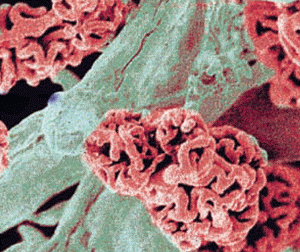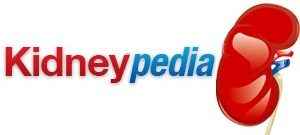
Chronic kidney disease, or CKD, is a condition in which the functioning of the kidneys suffers progressive damage until, in the final stages, the kidneys become incapable of doing their job of purifying the blood and eliminating waste products. The final prognosis for CKD is fatal if not treated.
Causes
There are three common causes of CKD that, together, account for about three quarters of all cases in adults. Those three causes are diabetes, high blood pressure, and a condition called glomerulonephritis, which is a disease characterized by inflammation of the small blood vessels in the kidneys. These small blood vessels are called glomeruli, hence the name.
Diabetes in turn has a number of underlying causes including heredity, diet, and obesity. High blood pressure or hypertension is related to obesity as well, along with alcohol consumption, cigarette smoking, lack of exercise, heredity, and dietary factors including high consumption of sodium. All of these factors can increase the risk for kidney disease.
Stages
CKD is divided by physicians into five progressive stages. The stages of CKD are measured by reduction in the glomular filtration rate or GFR, which is a measure of kidney functioning. CKD stages are also demarked by observable damage to the kidneys themselves. Either loss of kidney function or observable kidney damage is considered to indicate kidney disease. Loss of function is one of the two primary complications of CKD, the other being increased risk of cardiovascular disease. Damage to the kidneys even if not accompanied by loss of function increases the risk of kidney function being lost.
Stage 1
The kidneys show slight damage and/or GFR is at 90 ml/min/1.73 square meters or higher (considered minimal reduction in function. Kidney damage may be detected by medical imaging or by blood or urine tests. The damage to the kidneys is not great, and if the disease is halted at this stage the patient will suffer no long-
Stage 2
The kidneys show mild damage and/or GFR is at between 60 and 90 ml/min/1.73 square meters (considered mild reduction in kidney function). As with stage 1, long-
Stage 3
Stage 3 is characterized by moderate kidney damage with GFR between 30 and 60 ml/min/1.73 square meters. If the damage is halted at this stage, the patient will need to be monitored for possible complications such as cardiovascular disease; however, it’s unlikely that renal replacement therapy will be required.
Stage 4
Stage 4 shows severe renal function reduction, between 15 and 30 ml/min/1.73 square meters. Renal replacement therapy is likely to be necessary.
Stage 5
In CKD stage 5, GFR drops below 15 ml/min/1.73 square meters and the kidneys are effectively nonfunctional. Renal replacement therapy is absolutely necessary; the patient will almost certainly die without it.
Treatment
Early stages of chronic kidney disease are treated by lowering blood pressure and treating any other underlying causes of the disease, such as diabetes. The goal is to halt progression of the disease to the point where renal replacement therapy (e.g. dialysis) is needed. In the final stages of CKD, treatment consists of regular dialysis or a kidney transplant. The damage from CKD is irreversible, so the goal is to halt the progression rather than repairing the damage.
The prognosis for patients with chronic kidney disease is guarded. In addition to the direct effect of lost kidney function, CKD increases the risk of cardiovascular disease. This is most often the cause of death for CKD patients whether they progress to stage 5 of the disease or not. (As a cautionary note regarding causation, high blood pressure, which is a factor increasing the risk of CKD, also increases the risk of cardiovascular disease. There may or may not be a direct causal link between CKD and cardiovascular illness.)
CKD Diet
One of the chief approaches to treating early-
When the patient is on dialysis, other concerns enter the picture. Protein intake is increased over the diet appropriate for early CKD treatment to repair the tissue damage often caused by dialysis. Also, the amount of water intake is monitored and reduced while on dialysis, as fluid can build up in the body between sessions of dialysis and this can pose a danger in itself (the kidneys, in addition to removing waste products, also remove excess water, as does dialysis).
